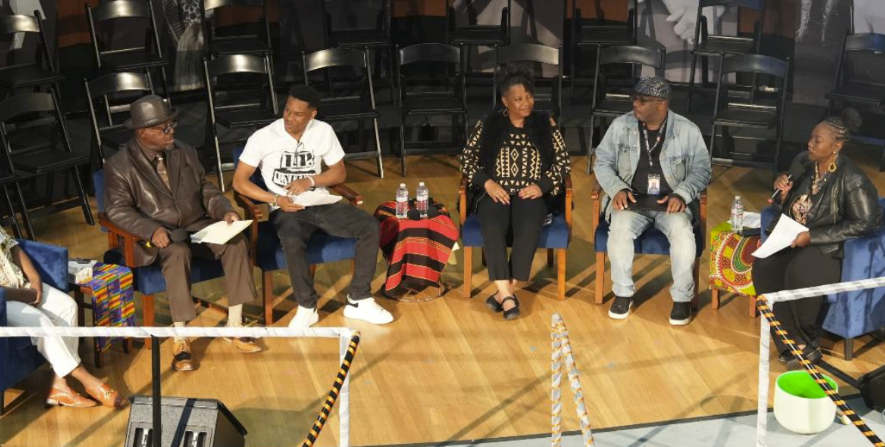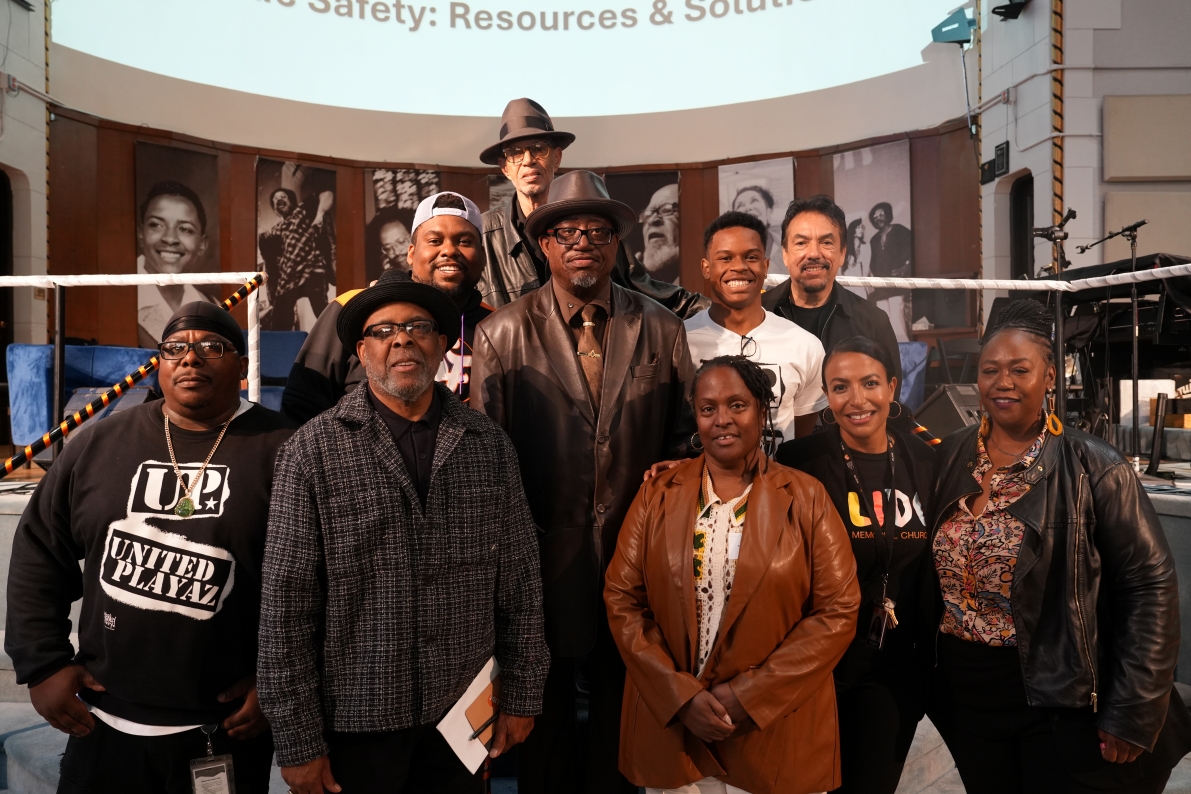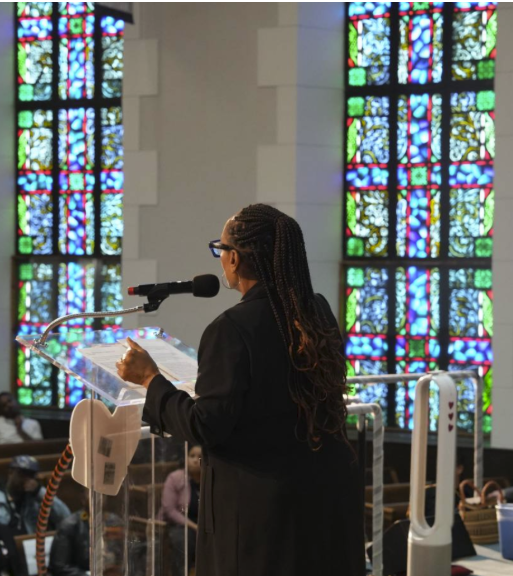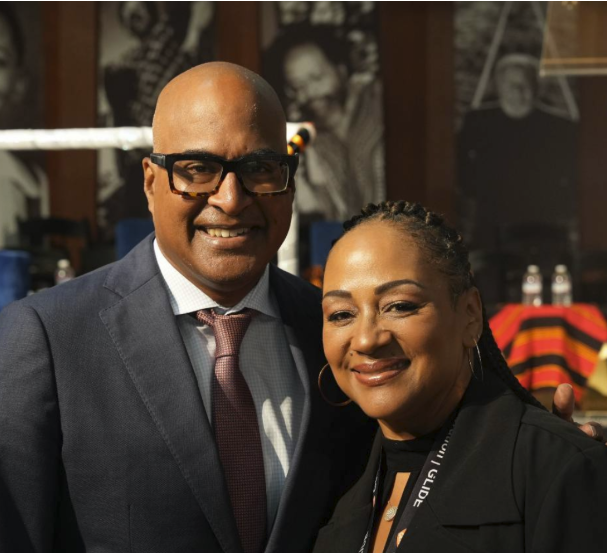
On Thursday, July 24th, GLIDE hosted a powerful community-led Public Safety Forum, bringing together over 130 youth, community members, non profit leaders, and city workers to collaborate on real solutions to improve safety and well-being in our San Francisco neighborhoods.
Community leaders pictured below convened the forum with a simple dream: to ensure that community feedback is the first stop, not the last, when it comes to the city developing policy.

Bishop Ishamel Burch opened the forum by remarking, “Everyone wants to be safe, right? We have so many problems, but by coming together, we can truly make a difference.”
Every Neighborhood in San Francisco Deserves to Feel Safe
GLIDE’s President & CEO Dr. Gina Fromer gave an opening keynote, talking about her experience growing up in Bayview. Despite the Bayview being stereotyped as an unsafe neighborhood, Dr. Gina felt safe there as a child– because everywhere she went, people were looking after her. She talked about going to the YMCA and the library as a teenager– and feeling like the librarian and youth workers really cared about her.
For Dr. Gina, it was devastating to turn on the news this spring and see a woman she grew up with crying about the death of her 27-year old son due to gun violence. This tragic death helped inspire and motivate our community leaders to convene this forum.
A focus of the keynote was how safety resources are distributed inequitably between San Francisco’s neighborhoods. “We hear sirens all night long in Tenderloin, but we don’t hear sirens in Pacific Heights,” Dr. Gina pointed out. “There are some neighborhoods where the mom peeks out the door in the morning before taking the children out, just to make sure there’s no dead body on the ground when they walk out the door. It’s not new, we’re just tired of it. And now you’re going to listen to us!”

After Dr. Gina’s opening remarks, we had an inspirational panel featuring Ziggy Brown from the youth group United Playaz, Rev. Stephanie Burch from the St Andrews Missionary Baptist Church, Richard Beal from the Tenderloin Housing Clinic, Shavonne Allen from Skywatchers, and GLIDE’s very own Freddy Martin. The panel was moderated by Tinisch Hollins, the Executive Director of Californians for Safety and Justice.
To Increase Safety, Increase Opportunities to Build Relationships
Tinisch Hollins opened with a reminder, “If things get better in the Tenderloin, they get better in San Francisco. When we improve conditions for our people, it benefits everybody. That’s the message we bring to City Hall every day.”
Ziggy Brown, our high-school age panelist, spoke to the experience of growing up in unsafe parts of San Francisco. “It was a struggle seeing people collapse, always seeing the ambulance. But this is a very big deal for us [marginalized community] as a community: getting invited to GLIDE so we can get our ideas out, and talk about what we need to better ourselves and our future.”
Reverend Stephanie Burch talked movingly about her experience losing two of her sons to violence, and spoke strongly about the need to “take back,” the TL and recreate it as a place of safety. “People are scared to come to the Tenderloin looking nice,” she observed. “Well, I like to look nice for work. We need to take our joy back, take our strength back. I’m hoping that together, we can all decide we want our streets back.”
Richard Beal observed that public safety absolutely begins with relationships and community. He urged the audience, “As you walk through the neighborhood, grab someone and find out where they work, what they do. It’s all about showing people you care about them.”
Freddy Martin doubled down on that point, saying, “Whether someone is a victim or a perpetrator, when you understand who they truly are, you will see them differently. We’ve got to talk openly about these things, because otherwise how will we find the solution?”
The audience applauded when they heard, “We need to go to the mayor and tell him what it’s really like in our neighborhoods. You don’t know what it’s like if you’re just sitting in your office, going from BART to your office and your office to BART.”
The panelists agreed strongly with Dr. Gina’s keynote when it came to the importance of giving youth places where they felt safe– places to better themselves and do supervised activities. Shavonne Allen observed, “Youth want to be a part of things. They have things to say, and a vision of the society and the world they want to live in. We really need to listen. Be the auntie, be the uncle, invite them someplace, take them to lunch. Some are just missing that support system– so listening to their story can be a really big deal.”
The panelists also discussed the stress of navigating unsafe and unclean streets, the negative consequences of Prop 36, and the systemic forces which push the city’s problems into the Tenderloin. Freddy Martin received applause when he declared, “The money and funds taken out of the community historically need to be reinvested in the community.” He suggested it should be a requirement that city leaders visit different neighborhoods in the city to listen and learn on a monthly basis.
Developing Policy Recommendations on Drug-Related Crime, Public Safety, and Access to Treatment
Afternoon breakout groups were on reducing drug-related crime, enhancing public safety, and expanding access to treatment. The goal of the break-out sessions was to develop policy recommendations to bring to city leaders.
- Breakout group #1 Behavioral Health Crisis Response was led by the Department of Public Health, Equity Office did a deep dive into how to get people treatment resources without exposing them to stigma.
- Breakout Group #2 Public Safety Resources was led by GLIDE’s community safety team pointed out the importance of giving people safety options, in order to break out of the cycle of “one size fits none,” policies.
- Breakout Group #3 Youth Engagement and Awareness was led by Ziggy Brown from the United Playaz which surfaced insights like, “Sometimes our youth just need someone to bring out the best in them– someone who can relate to them,” an observation made by a youth named Damien.
Thank you to San Francisco’s Public Defender Manohar Raju for turning out to the event, and lending a listening ear to our community! We look forward to presenting city leaders with our policy recommendations.

